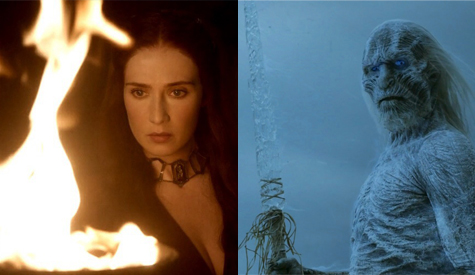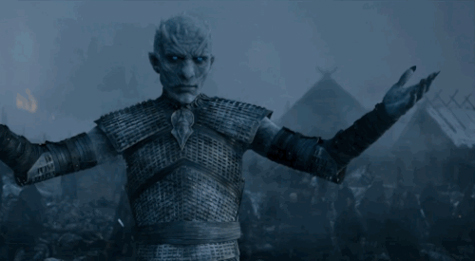
It’s no secret that George R. R. Martin examined several religions and mythologies when creating his world in the series A Song of Ice and Fire—and the Game of Thrones HBO series. What is fascinating is how he blends these particulars together and uses them in plain sight to enrich the series.
As the television series moves into its last two brief seasons and the supernatural forces start becoming more pronounced, it’s worth it to examine some of the source material to inform on our understanding of what’s going on in this rich world. In Part II of this look at religion in Game of Thrones, we’ll focus on some prominent supernatural aspects, the gods of ice and fire.
See also: Exploring the Religion of Game of Thrones Part I: The Old Gods
Rh’llor is the fire god, which everyone knows thanks to characters such as Melisandre and Thoros. There is no doubt that priests of the “one true god” have power. Melisandre can’t be poisoned or burned, she gave birth to a shadow demon, and she recently resurrected Jon Snow—a feat she copied from Thoros.

The fire god has a counterpart, not really mentioned in either the show or the series. It’s simply known as the Great Other, but it is the power most likely behind the Others (White Walkers in the show). Yes, the show recently revealed that the Children created them, but that’s off-book and actually clashes with the timeline of the show (but I won’t go into that here).
What this gives us is diametrically opposed elemental forces. It extends further when we examine the dragons. Obsidian, known as dragonglass, is created from either dragonfire or volcanoes. Likewise, Valyrian steel is forged using dragonfire. The walkers, for their part, are overly obsessed with ice, able to freeze at a touch.
Martin has admitted that this religion is based on Zoroastrianism—centered in Persia, modern-day Iran—which features Ormazd, a god of light, good, and knowledge. Literally opposite of Ormazd is Ahriman, which is darkness, evil, and ignorance—the true antithesis of Ormazd.
The Zoroastrian creation begins with Ormazd using his light to create all manner of things, including all of the cosmological standards: earth, moon, stars, sun, other gods, and life. However, this light proves to be disruptive to Ahriman. He was resting comfortably in the chaos before creation, but Ormazd messed all of that up, so he’s cranky.
Ahriman also has the power to create, but everything seems to be a parody of Ormazd’s creations, made to corrupt or destroy. Essentially, Ormazd is responsible for all that is good in the world, while Ahriman creates everything evil. Ahriman even goes so far as to create an evil version of woman, complete with special, feminine evils, in order to corrupt the humanity that Ormazd created.
These two are locked into an eternal struggle, though the outcome in Zoroastrianism is obvious, as light and knowledge will ultimately prevail over darkness and ignorance. But, it’s the adversarial role that’s important, especially for Game of Thrones. Clearly, Ormazd is Rh’llor, while Ahriman is the Great Other—carrying the metaphor of ignorance to the being’s name. The struggle is reflected in the title of Martin’s series, A Song of Ice and Fire. Theirs is an elemental struggle, fire meeting ice. Warm light and knowledge war with cold darkness and ignorance. Their duality keeps creation in motion, much like the seasons.
This duality is rare in mythology; it’s a blending of monotheism with polytheism. Most cultures of the world developed polytheistic mythologies, such as: Greece, Egypt, India, and Babylon. Some, like the Egyptians, have hundreds or even thousands of gods, not unlike the current number of Pokémon.
The Persian myth, though, while not monotheistic, is very close to it without suffering from the same innate logical problems. Monotheism was very difficult to understand in the ancient world for a couple of reasons, which many medieval authors struggled with in regards to the early Christian Church.
The big problem for monotheism comes from the nature of God: If there is only one ostensibly benevolent creator god, then where did all of the bad stuff in the world come from? And, why would a benevolent god do that to people? Quite simply, this is a concept that still has not been resolved as people quickly cry, “Why did God let this happen?”
But, the duality of Ormazd and Ahriman—and by extension Rh’llor and The Great Other—sidesteps this problem. Ahriman is the source of that evil, actively trying to tear down and corrupt Ormazd’s creations. The Great Other has the Others, a parody of humanity, embracing the cold darkness and wanting to extinguish light. They further distort creation by raising up undead wights to fight their battles.

While Ormazd is a representation of good, it’s not completely clear if Rh’llor feels the same way about humanity. This may simply be a war for victory, where Rh’llor doesn’t care about humanity’s—or the world’s—survival, so long as The Great Other is defeated. The numerous sacrifices, painful resurrections, and destruction by dragons may indicate that he is not as benevolent as Ormazd and simply that Rh’llor and The Great Other are both giants in the playground, ready to trample the ants beneath.
As the inevitable war with the White Walkers comes closer, these two deities are going to become more prominent in their roles, as their magic has become more pronounced.
Andy Adams is an adjunct professor of English at various colleges in the Phoenix area. He has an affectation for fedoras as they complement his villainous goatee. He’s been known to poke his head onto Twitter @A3Writer, but he’s never been big into birds. He blogs at A3writer.com about writing, teaching, and the conquest of fictional worlds—they’re more fun than the real world.
Read all posts by Andy Adams for Criminal Element.
